1、Algorithm Introduction
(1)、Binary_Search

#include <stdio.h>
#define N 100
//子函数实现二分搜索算法,查找给定元素 x 的位置
int Binary_Search(int a[],int low,int high,int x)
{
int mid;
mid=(low+high)/2;
if(low>high)
return -1; /*查找失败*/
else if(x==a[mid])
return mid; /*找到元素的位置并返回*/
else if(x>a[mid])
return Binary_Search(a,mid+1,high,x);
else
return Binary_Search(a,low,mid-1,x);
}
void main()
{
int a[N];
int i,t,x,n;
printf("请输入已排序数组中元素的个数 n:");
scanf("%d",&n);
printf("请输入已排序数组中的元素(共%d 个数):\n",n);
for(i=0;i<n;i++)
{
scanf("%d",&a[i]); /*从键盘输入一组数*/
}
printf("请输入要查找的元素 x 为:");
scanf("%d",&x);
t=Binary_Search(a,0,n-1,x); /*调用子函数,查找元素 x 在数组 a[n]中的位置*/
if (t==-1)
printf("\n 查找失败!");
else
printf("元素 x 是数组中第%d 个元素。\n",t+1); /*因为数组的下标从 0 开始,实际的位置应为其坐标位置加 1*/
}
(2)、Merge_Sort

#include <stdio.h>
#include <stdlib.h>
#define N 8
//将两个有序的数组 R[low...m]和 R[m+1...high]归并成一个有序的数组 R[low..high]
void Merge(int R[],int b[],int low,int m,int high)
{
int i=low,j=m+1,p=0;
while(i<=m&&j<=high) /*两子数组非空时取其小者输出到 R1[p]上*/
b[p++]=(R[i]<=R[j])?R[i++]:R[j++];
while(i<=m) /*若第 1 个子文件非空,则复制剩余记录到 R1 中*/
b[p++]=R[i++];
while(j<=high) /*若第 2 个子文件非空,则复制剩余记录到 R1 中*/
b[p++]=R[j++];
for(p=0,i=low;i<=high;p++,i++)
R[i]=b[p]; /*归并完成后将结果复制回 R[low..high]*/
}
//用分治法对 R[low..high]进行二路归并排序
void MergeSort(int R[],int low,int high)
{
int mid;
int b[N];
if(low<high) /*区间长度大于 1*/
{
mid=(low+high)/2; /*分解*/
MergeSort(R,low,mid); /*递归地对 R[low..mid]排序*/
MergeSort(R,mid+1,high); /*递归地对 R[mid+1..high]排序*/
Merge(R,b,low,mid,high); /*组合,将两个有序区归并为一个有序区*/
}
}
void main()
{
int a[N];
int i,j;
for(j=0;j<N;j++)
a[j]=rand()%100; /*系统随机生成 8 个数*/
//scanf("%d",&array[j]); //取消此注释语句可以手动输入无序数组
printf("随机生成数组为:\n");
for(i=0;i<N;i++)
printf("%d ",a[i]);
MergeSort(a,0,N-1);
printf("\n 已排序数组为:\n");
for(i=0;i<N-1;i++)
printf("%d ",a[i]);
printf("\n\n");
}
2、Maximum Contiguous Subarray Problem
(1)、Overview
- Clean way to illustrate basic algorithm design
-
- A Θ(n 3) brute force algorithm
- A Θ(n 2) algorithm that reuses data
- A Θ(n log n) divide-and-conquer algorithm
- Cost of algorithm will be number of primitive operations, e.g., comparisons and arithmetic operations, that it uses.
(2)、MCS Example

Between years 5 and 8 ACME earned 5 + 2 − 1 + 3 = 9 Million Dollars
This is the MAXIMUM amount that ACME earned in any contiguous span of years.
Examples: Between years 1 and 9 ACME earned −3 + 2 + 1 − 4 + 5 + 2 − 1 + 3 − 1 = 4 and between years 2 and 6 2 + 1 − 4 + 5 + 2 = 6
The Maximum Contiguous Subarray Problem is to find the span of years in which ACME earned the most, e.g., (5, 8).
(3)、Formal Definition
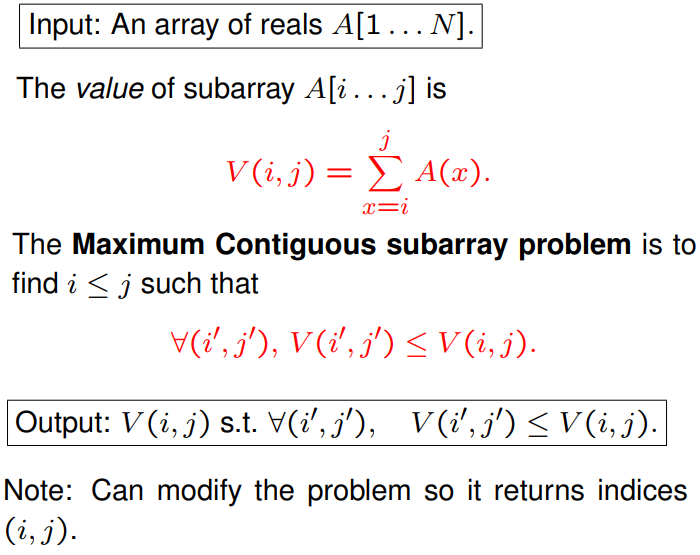
(4)、Θ(n 3) Solution: Brute Force
Idea: Calculate the value of V (i, j) for each pair i ≤ j and return the maximum value.
VMAX=A[1];
for (i=1 to N)
{
for (j=i to N)
{
// calculate V(i, j)
V=0;
for (x= i to j)
V=V+A[x];
if (V > VMAX)
VMAX=V;
}
}
return VMAX;
(5)、Θ(n 2) Solution: Reuse data
Idea: We don’t need to calculate each V (i, j) from “scratch” but can exploit the fact that

VMAX=A[1];
for (i=1 to N)
{
V=0;
for (j=i to N)
{
// calculate V(i, j)
V=V+A[j];
if (V > VMAX)
VMAX=V;
}
}
return VMAX;
(6)、Θ(n log n) Solution: Divide-and-Conquer
Idea: Set M = [(N + 1)/2] , [] indicates rounding down temporarily.
Let A1 and A2 be the MCS that must contain A[M] and A[M + 1] respectively. Note that the MCS must be one of
- S1 : The MCS in A[1 . . . M]
- S2 : The MCS in A[M + 1 . . . N]
- A : Where A = A1 ∪ A2

(7)、Example
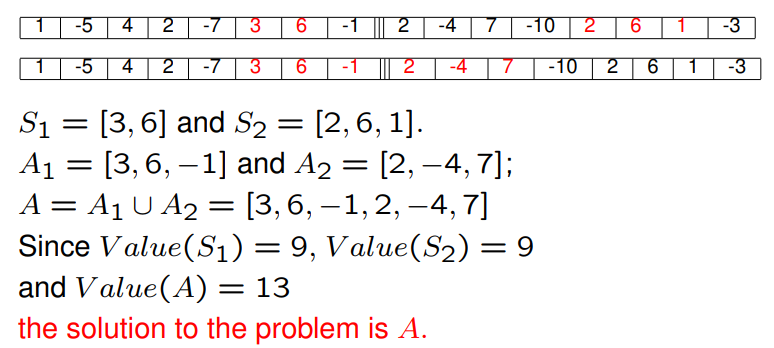
(8)、Finding A : The conquer stage

MAX=A[M];
SUM=A[M];
for (k=M-1 down to i)
{
SUM+=A[k];
if (SUM > MAX)
MAX=SUM;
}
A_1=MAX;

(9)、The Full Divide-and-Conquer Algorithm
// Input : A[i . . . j] with i ≤ j
// Output : the MCS of A[i . . . j]
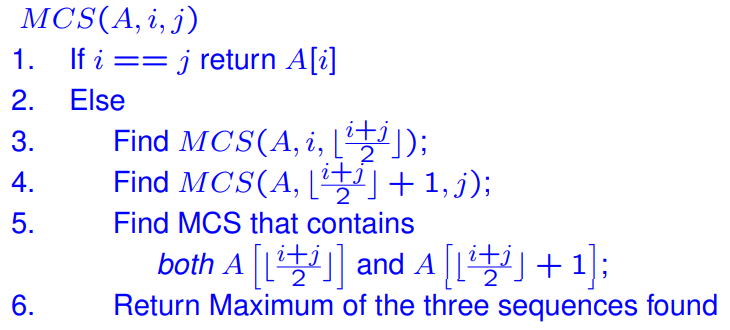
(10)、A full example
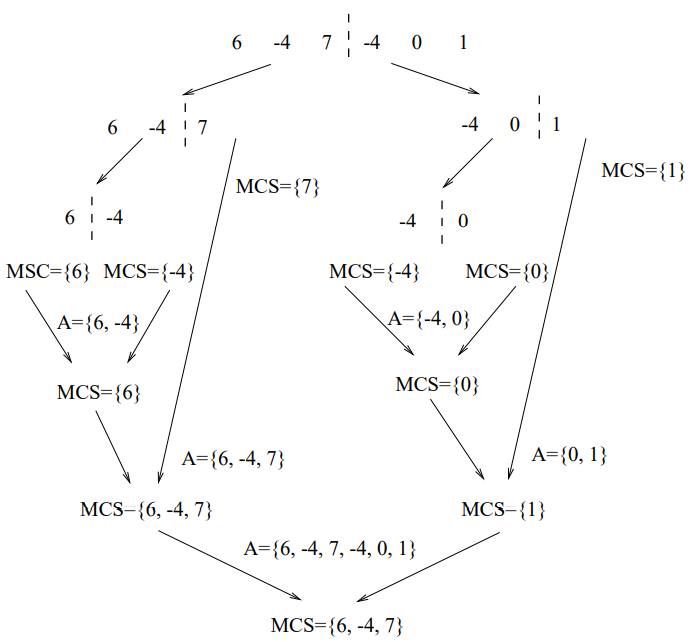
(11)、Analysis of the DC Algorithm
Let T(m) (where m is the problem size) be time needed to run
MCS(A, i, j), (j − i + 1 = m)
Step (1) requires O(1) time.
Steps (3) and (4) each require T(m/2) time.
Step (5) requires O(m) time.
Step (6) requires O(1) time
Then T(1) = O(1) and for n > 1, T(n) = 2 T(n/2) + O(n)
To simplify the analysis, we assume that n is a power of 2.
T(n) ≤ 2 T( n 2 ) + c n.
Repeating this recurrence gives
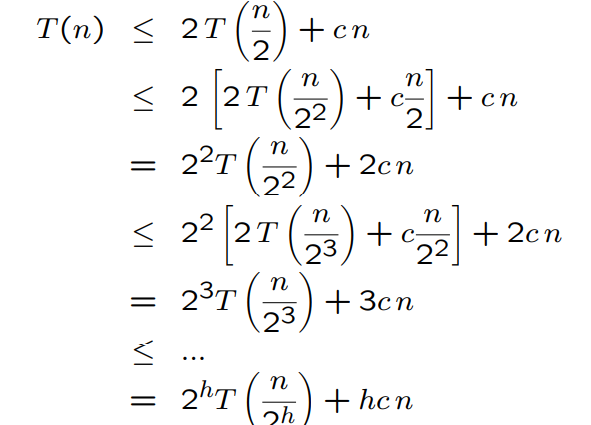
Set h = log2 n, so that 2 h = n.
With this substitution, we have

(12)、Review
In this lecture we saw 3 different algorithms for solving the maximum contiguous subarray problem. They were
- A Θ(n 3) brute force algorithm
- A Θ(n 2) algorithm that reuses data
- A Θ(n log n) divide-and-conquer algorithm